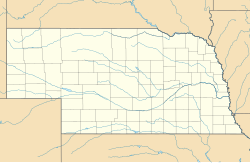Mason School | |
 Mason School, seen from 24th Street | |
 Interactive map showing the location of Mason School | |
| Location | 1012 South 24th Street, Omaha, Nebraska |
|---|---|
| Coordinates | 41°15′01″N95°56′52″W / 41.2502°N 95.9479°W |
| Built | 1888 [1] |
| Architect | Mendelssohn, Fisher and Lawrie |
| Architectural style | Richardson Romanesque |
| NRHP reference No. | 86000339 [2] |
| Significant dates | |
| Added to NRHP | March 13, 1986 |
| Designated OMAL | January 28, 1986 [1] |
Mason School is located at 1012 South 24th Street in south Omaha, Nebraska, United States. Designed in the Richardson Romanesque style by the architectural firm of Mendelssohn, Fisher and Lawrie, the school was built in 1888 by the brick manufacturing and construction firm of Hadden, Rocheford & Gould. The school closed in the late 1970s and was converted into apartments. It was designated an Omaha Landmark in 1986 and listed on the National Register of Historic Places that same year.

